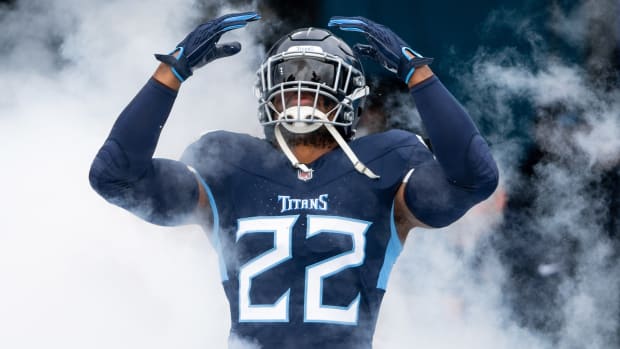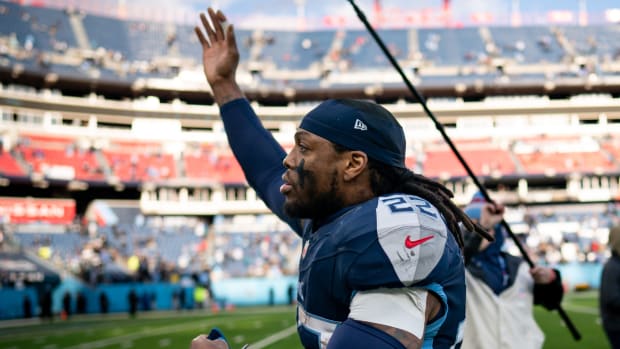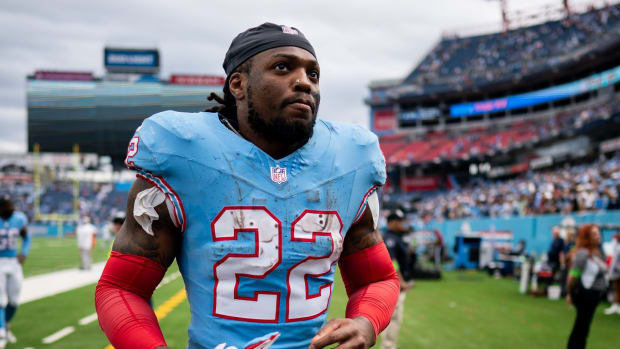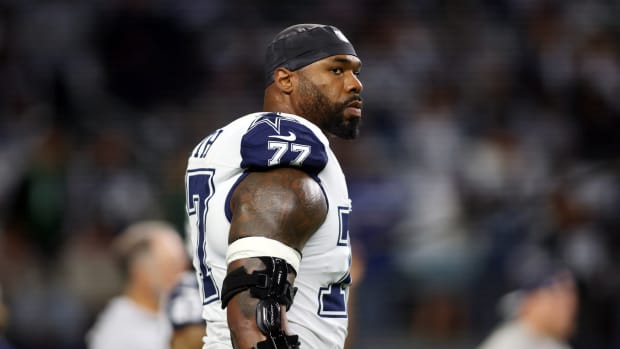Jets 27, Titans 24 (OT): Moments That Mattered
By almost any measure, the Tennessee Titans’ 27-24 overtime loss to the New York Jets on Sunday was a disaster.
The Titans (2-2) scored on their first three possessions yet could not put the game out of reach against a winless opponent. They led by a touchdown early in the fourth quarter yet trailed by seven just over four minutes later against a team that did not score a touchdown in its previous two games. They could not protect their quarterback. They gave up too many big plays. On and on it went all the way until kicker Randy Bullock missed a 49-yard field goal attempt in the final minute of overtime that would have at least salvaged a tie.
There was a lot that went wrong. These are some of the moments that mattered most.
Down Goes Tannehill: Quarterback Ryan Tannehill had the option to throw on the Titans’ first offensive play as he rolled to his right, but ultimately kept it and ran for seven yards. Two plays later, he dropped straight back – and got dropped for a sack and a loss of six yards.
Tannehill might have spent the better part of the afternoon, but he never had that much time or room to escape. The Jets sacked him seven times and hit him a total of 14. There are six NFL teams that have not allowed seven sacks thus far this season, and the Jets had just six through their first three games. Tannehill was not sacked or hit as often in the Week 1 loss to the Cardinals, which was a game that looked about as bad as it could get in terms of pass protection. This was even worse, and it cost the Titans dearly as two of the sacks forced them to kick field goals and one knocked them out of field goal range.
McNichols Catches On: On the Titans’ fifth offensive play, running back Jeremy McNichols took a short pass from Ryan Tannehill and turned it into 27-yard gain. It was the longest pass reception of his career, but even more notable was the fact that he did it on third-and-21 and kept the opening drive alive.
The journeyman carved out a role for himself in 2020 largely because of his ability as a blocker on pass plays. On this day, he emerged as a legitimate target in the passing game. McNichols had a game-high eight receptions (on 12 targets) for 74 yards. He accounted for the offense’s two biggest plays of the game (he added a 23-yard reception in the third quarter) and gave defenses something else to consider. After all, prior to this one, he had 19 receptions for 115 yards in 23 games.
A Line Too Far: That opening possession ultimately lasted 12 plays but stalled at the Jets’ 17, when Tannehill was sacked on third down for a loss of nine yards. The Titans settled for a 44-yard Bullock field goal and an early 3-0 lead.
Unfortunately, that drive was a sign of what was to come. New York came into the game with one of the NFL’s best red zone defenses and only enhanced its reputation in that regard. Each of the first three times the offense had the ball, it got inside the Jets 15 but failed to score any touchdowns. In all, the Titans had five red zone opportunities but scored just two touchdowns, which made it just the third time since Tannehill became their starting quarterback that they were 40 percent or worse in red zone conversions.
Davis Goes Deep: Former Titans wide receiver Corey Davis had a 30-yard reception with 9:18 to play in the second quarter, one snap after his first reception of the contest. The long gain not only got the Jets across midfield for the first time it showed their coaches the best way to attack Tennessee’s defense.
After that, New York had four more pass plays that covered 29 yards or more, one in the third quarter, two in the fourth and one in overtime, including a 53-yard touchdown catch by Davis. The five long pass plays accounted for 195 yards, 54.9 percent of the Jets’ total offense, and all three of New York’s touchdown drives and its overtime possession, which ended with the decisive field goal, included one of those plays.
Flying Flag: As so often is the case, Tennessee’s offense showed it can execute when the game is on the line, but in this case, that unit needed a Jets penalty to get going. On fourth-and-10 from the 26 with 1:49 left in regulation, Tannehill’s pass to Chester Rogers fell incomplete, but officials called pass interference, which gave the Titans 22 yards and a first down.
From there, Tannehill and Co. drove the final 52 yards without ever facing third down capped by Cameron Batson’s game-tying 2-yard touchdown catch with 16 seconds to go, which forced overtime. Tennessee was 4-0 in overtime games under Vrabel, including a 33-30 victory at Seattle two weeks earlier, another game it tied with a touchdown in the final minute of regulation.
"We knew we could come back and win this game," right tackle David Quessenberry. "I felt like every guy in that locker room felt like we were going to win that game."
In overtime, they put together a 13-play drive, their longest of the day in terms of the number of plays, but came away with no points – and the loss – after Bullock’s miss.





